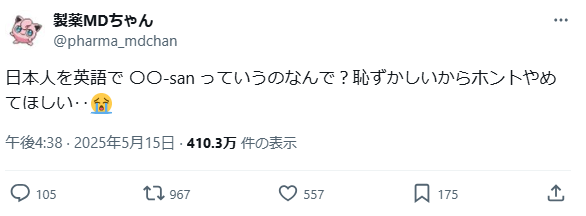
「“〇〇-san”は恥ずかしい?グローバル時代の呼び方事情」
英語圏で日本人が「〇〇-san」と呼ばれる場面が増えている。SNSでは「日本人を英語で 〇〇-san っていうのなんで?恥ずかしいからホントやめてほしい‥😭」という投稿が話題となった▼日本語の敬称がそのまま英語に持ち込まれることに、戸惑いや違和感を覚える人は少なくない。日本文化へのリスペクトとして受け止める声がある一方、「距離を感じる」「親しくなれない」と感じる人もいるようだ▼そもそも「-san」は、性別や年齢、既婚・未婚を問わず誰にでも使える便利な敬称だ。欧米のMr.やMs.のように使い分ける必要がなく、相手を間違って呼んでしまう心配もない。実際、海外のビジネス現場では「-san」が重宝されている。性別や身分を気にせず使えるため、LGBTQ+の観点からも支持されているという▼一方で、日本人同士の感覚では「-san」がつくことで、どこか他人行儀な雰囲気が生まれることもある。SNSには「first nameで呼んでほしい」「距離を感じる」といった声が並ぶ。親しくなればニックネームや下の名前で呼び合うのが自然だと考える人にとっては、「-san」が壁に感じられるのだろう▼なぜ「恥ずかしい」と感じるのか。あるユーザーは「スシやラーメン、カワイイなどの日本語が英語に定着するのは気にならないのに、-sanだけが恥ずかしいのはなぜ?」と疑問を投げかける。自分たちの文化が“外国語化”されることへの照れや、呼ばれ方に対する個人的なこだわりが影響しているのかもしれない▼「-san」は、グローバル社会で生まれた新しいコミュニケーションの形だ。距離を感じるなら「first nameで呼んで」と伝えればいいし、誇りに思うならそのまま受け入れればいい。大切なのは、自分の気持ちを率直に伝え、相手の意図も理解することだろう▼“〇〇-san”という呼び方は、便利でフラットな敬称であると同時に、日本人にとっては微妙な心の距離を映し出す鏡でもある。グローバル社会の中で、自分らしい呼ばれ方を模索し続けることも、また一つの国際感覚なのかもしれない。

https://x.com/pharma_mdchan/status/1922919575533883752

【英語訳】”Is ‘○○-san’ Embarrassing? Name Etiquette in the Global Era”
There’s an increasing trend of Japanese people being addressed as “○○-san” in English-speaking contexts. A social media post stating “Why do people call Japanese people ‘○○-san’ in English? It’s embarrassing and I really wish they’d stop… 😭” has sparked discussion.
Many Japanese people feel confused or uncomfortable when Japanese honorifics are directly imported into English. While some appreciate it as respect for Japanese culture, others feel it creates distance or prevents closer relationships.
Fundamentally, “-san” is a versatile honorific that can be used for anyone regardless of gender, age, or marital status. Unlike Western Mr. or Ms., there’s no need to distinguish between different forms, eliminating the risk of addressing someone incorrectly. In international business settings, “-san” has become valued precisely for this reason. Its gender-neutral and status-neutral nature has even garnered support from LGBTQ+ perspectives.
However, among Japanese people, adding “-san” can create a somewhat formal atmosphere. Social media comments reveal many prefer “first name” usage, saying “-san” feels distant. For those who naturally progress to nicknames or first names as relationships develop, “-san” may feel like a barrier.
Why do some find it “embarrassing”? One user questioned, “Why don’t we mind Japanese words like sushi, ramen, and kawaii becoming part of English, but feel embarrassed about -san?” Perhaps it’s shyness about seeing elements of one’s culture “foreignized,” or personal preferences about how we’re addressed.
“-San” represents a new form of communication born in our global society. If it feels distant, one can simply ask to be called by their first name; if it feels respectful, one can embrace it. What’s important is honestly expressing your feelings while understanding the other person’s intentions.
The “○○-san” address style is both a convenient, neutral honorific and a mirror reflecting subtle interpersonal distances for Japanese people. Perhaps continuing to explore our preferred forms of address in global society is itself a form of international sensibility.







